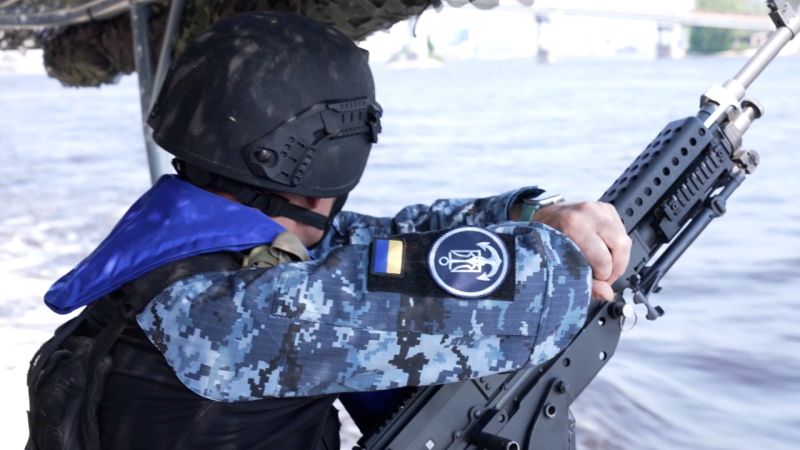
Formidable patrol boats are giving Ukraine the edge along the Dnipro River
The 34-foot vessel speeds along Ukraine’s Dnipro River at maximum velocity, before its captain shouts: “Hold!” It does a snap turn and then smoothly moves on, in a seamless motion, barely slowing down.
With little armor, the US-donated Dauntless Sea Ark patrol boat relies on speed to evade attacks, and its impressive maneuverability is a key asset for Ukraine’s recently established river fleet.
“We’re looking for any kind of enemies everywhere, air, on land and on the river as well,” Captain Anton, his surname withheld for security reasons, says of his mission. “All the river Dnipro, from the north to the south, the riverine fleet must protect it.”
With a length of almost 1,400 miles (2,200 km) the Dnipro is the fourth longest river in Europe, rising in Russia, flowing through Belarus and Ukraine, before finally ending in the Black Sea. It cuts through Ukraine, connecting some of its major cities — such as Kyiv, Dnipro, Zaporizhzhia and Kherson — providing water, electricity and a natural barrier against advancing armies.
Its water supply helps cool the reactors of the Zaporizhzhia nuclear power plant. And the destruction caused by the recent blast at the Nova Kakhovka dam also highlighted its importance for Ukrainians and Russians alike.
“The river is a strategic object,” Captain Anton says. “(Because of the explosion) now we can understand how it is important to make it a safe and secure place.”
For that reason Ukraine has been developing its river fleet, seeking to maintain control of the Dnipro and its shores, especially as it pushes through with its long awaited counteroffensive. In addition to some old Soviet equipment and civilian vessels modified for combat purposes, it has recently received support from the United States, NATO and other allies to bolster its fleet.
With a maximum speed of 35 knots (40 mph/65 kmh) and with three machine gun mounts, as well as 40mm grenade launchers, the Dauntless Sea Ark adds much-needed muscle to Ukraine’s riverine operations.
“Our mission is to patrol the Dnipro River, since it’s prohibited to use any kind of navigation since 24th of February 2022,” Captain Anton explains. “We have to check each boat, which is… now on the river to check whether they have any suspicious objects whatsoever.”
Their main concern initially was Russian infiltrators, or any related activity, but since Moscow started using Iranian-made Shahed drones to target cities, especially the capital Kyiv, they have taken on a new role.
“We’re taking part in air defense as well,” he says. Russia frequently flies the drones along the river, close to the water, making it more difficult for Ukrainian air defenses and radars to see and target them, and that’s where the river fleet comes in.
“In cases where Russia is using Shaheds, we can use (these boats) to try and strike them,” Captain Anton explains. “That’s part of our job as well.”
A growing part of an otherwise dwindling Navy
Most of Ukraine’s seafaring navy was lost in the first weeks of Russia’s full-scale invasion in February 2022, with Kyiv losing control of the seas to Moscow very early on. Ukrainian sailors famously refused to surrender control over the strategic Snake Island, telling the Russian flagship Moskva “go f*** yourself,” but were powerless to fight back.
Later on, Ukraine shifted the balance of power by relying on drones, Western-donated Harpoon anti-ship missiles, as well as its own domestic-made Neptune missiles, to push the Russian navy away from its shores — even sinking the Moskva and regaining control of Snake Island. Yet despite these successes, Kyiv has been unable to effectively challenge Moscow for control of the Black Sea.
Russia maintains a large fleet in the area and Western aid has largely been directed at bolstering Ukraine’s ground forces.
But it’s a different picture along the mighty Dnipro.
Ukrainian special forces have been using the waterway to launch raids across the river, since they retook the city of Kherson at the end of last year, carrying sabotage operations in Russian-controlled territory and, in some cases, successfully establishing foothold in some islands along the Dnipro.
In addition to those surprise attacks, units such as Captain Anton’s, which are currently stationed away from the battlefield, could play a role in future operations.
“We are ready,” he says. “If needed of course we’ll fight.”
